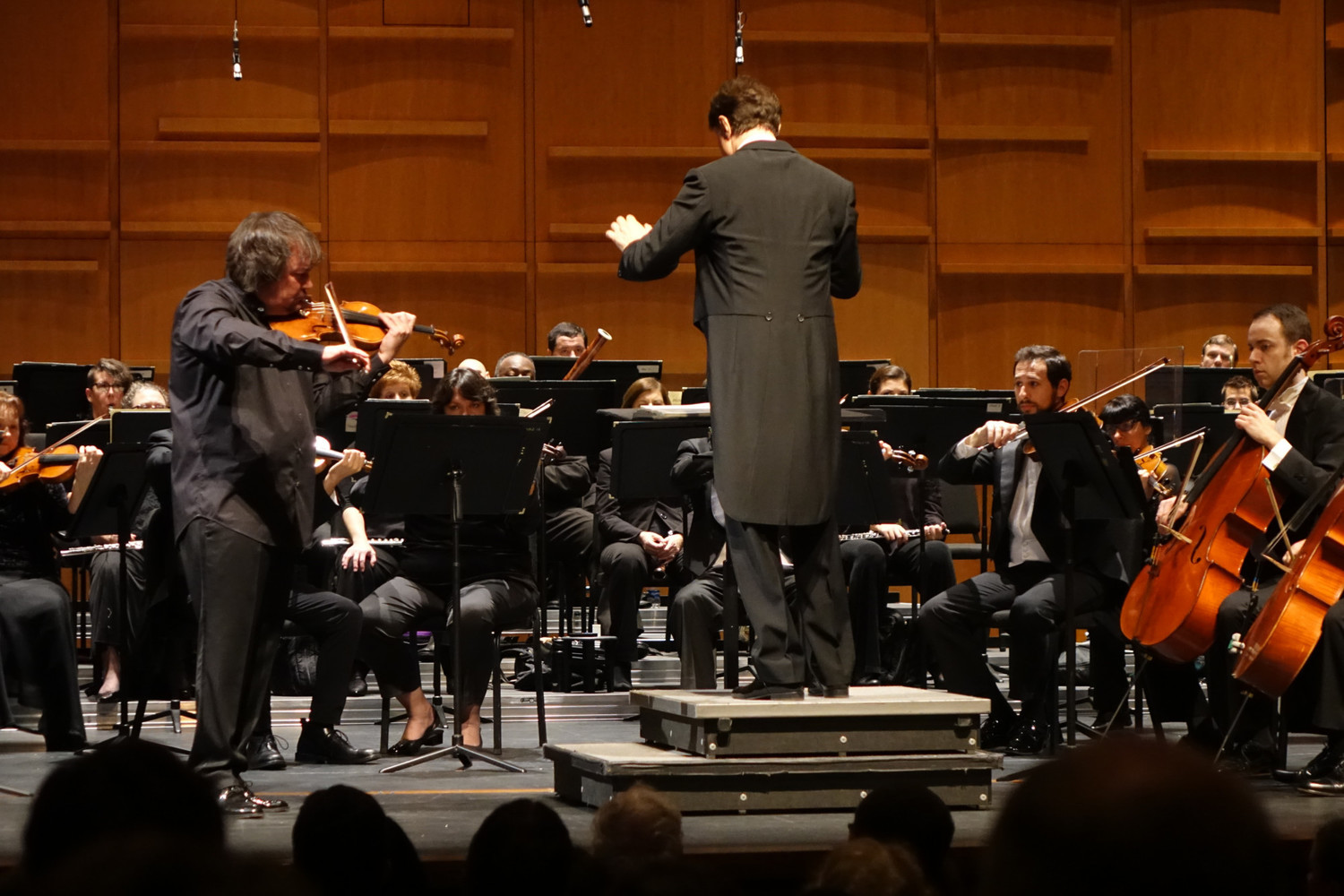Review: Mendelssohn's ITALIAN SYMPHONY Upstaged by Epic Paganini Concerto

Last week's Symphony concert at Knight Theater, ITALIAN SYMPHONY, was a bit of a double entendre. Yes, the featured work on the program was Felix Mendelssohn's Symphony No. 4, also known as the "ITALIAN," but all the other pieces on the bill had something Italian about them, even if the composers hailed from cooler climes. Other than Mendelssohn, we heard from Parisian maestro Hector Berlioz, whose musical marinara, gleaned from his poorly-received Benvenuto Cellini opera, was discreetly called "Roman Carnival Overture."
In between these two non-Italians, we heard from Luciano Berio and the virtuosic Niccolò Paganini. Our guest conductor, Milan native Roberto Abbado, sustained the Italian connection. Only our guest soloist, Muscovite violinist Sergej Krylov, broke the Italian mold - unless we also consider the Charlotte Symphony musicians.
The last time Symphony played the "Roman Carnival Overture" in 2012, we were also at Knight Theater, but maestro Christopher Warren-Green had to battle the embryonic acoustics of the stage, which swallowed much of sonic details before they reached the audience. With the handsome wood-grained shell that now encloses the orchestra, strings sounded mellower and more immediate, the thrumming percussion that prodded the tempo had a far more audible and visceral effect, and the whole piece was livelier, with trombones asserting themselves in the final build.
Abbado seized upon the intro to Paganini's Violin Concerto No. 1 - its precipitous pauses, hairpin tempo changes, sudden thunderous outcries, and outbreaks of joyous melody - and brought out its kinship with Rossini's overtures. The pause before Krylov's bravura entrance was so emphatic that the intro might rightly be looked upon as an overture. As for Krylov, while he isn't Italian, his pedigree for the Paganini concerto can hardly be bettered, for he studied under the renowned Salvatore Accardo, arguably the greatest living exponent of the entire Paganini violin repertoire. Accardo's six-CD collection; including six concertos, the famed Caprices, and more; is calling out loudly to everybody at Knight Theater who sampled the goodies.
Of course, seeing this music performed live surpasses what you can merely hear. The speed, the exquisite harmonics, the double bowing, and the ricochet bowing heighten the drama when you watch them executed with such energy, deftness, and excitement. In the heat of the opening Allegro maestoso movement, you could see concertmaster Calin Lupanu and principal cellist Alan Black craning their necks to see around Abbado and fully savor what Krylov was doing. Not only was it epic enough to draw their smiles, most of the audience jumped up and gave the violinist a rousing ovation - forcing him, somewhat sheepishly, to remind us that there were two more movements to come.
The middle Adagio movement really required the audience to quiet down if it were to be heard, an oasis of tranquility before another onset of dazzle and fireworks. Anyone who had overlooked the purity of Krylov's tone, particularly on the low notes and midrange of his instrument, could savor it here. Where the movement builds in volume and passion, both the soloist and the orchestra were up to the drama. The final Rondo: Allegro was shorter than the epic opening, but with some bodacious pizzicato work sprinkled amidst more frequent ricochet episodes, Krylov was no less spectacular, sparring a little with acting principal trumpeter Alex Wilborn along the way.
For those of us who love Luigi Boccherini's guitar quintets, it bordered on criminal that credit to Luigi as the original creator of "La ritirata di Madrid" was deferred to the program notes on Berio in Symphony's program booklet instead of in the main concert listing. All the guitar quintets are delightful, but the named pieces, the "Fandango" and "La ritirata," are the stunners. Both take their names from their fourth and final movements, where Boccherini stretches the limits of his ensemble - string quartet plus guitar - by adding percussion effects. In the "Fandango," he sneaks in a pair of castanets while the guitarist forcefully strums, but in the "Ritirata," the strumming of the guitar simulates the fanfare of a full marching band, supplying all the percussion as the platoon moves through town and retires quietly to its barracks.
With principal Andrea Mumm Trammell sweetly plucking her harp, Berio's orchestration of the arrival could be even quieter and stealthier. Nor did Berio deprive us of the services of traditional percussion - plus trumpets - where Boccherini had brought his quintet to a full roar. It was quite obvious that Abbado and Symphony relished their opportunity to bring orchestral power to this chamber music classic, and the fadeaway finish was absolutely adorable.
If Krylov's pedigree was optimal for the Paganini, then no less can be said for Abbado's with the Mendelssohn. Many regard the recordings by Claudio Abbado, Roberto's uncle, as the most definitive traversal of Mendelssohn's five symphonies. The nephew stamped his authority on the "ITALIAN" in the opening measures of the most familiar movement, the vibrant Allegro vivace. Unlike the metronomic statement of the long melody line that we heard from Warren-Green and the ensemble in 2013, Abbado had a freer feel for the opening movement, the violins setting an exuberant pace and the winds injecting softer replies.
While the middle movements were mellow and satisfyingly cohesive, contrasting effectively with the bracing beginning, Abbado seemed to allow the lull to have a lingering effect on the Saltarello: Presto finale. The two flutists, Amy Orsinger Whitehead and principal Victor Wang, led a spirited charge into the breech, but when the strings answered back, it was merely with their former exuberance and not with a new ferocity or fire. Instead of Mozart bumping into Beethoven, it was more like Mozart flowing into Mozart, insufficiently bolstered by the timpani and brass. The flutes' charge should have ignited more magic.
Photos by Perry Tannenbaum
Videos
